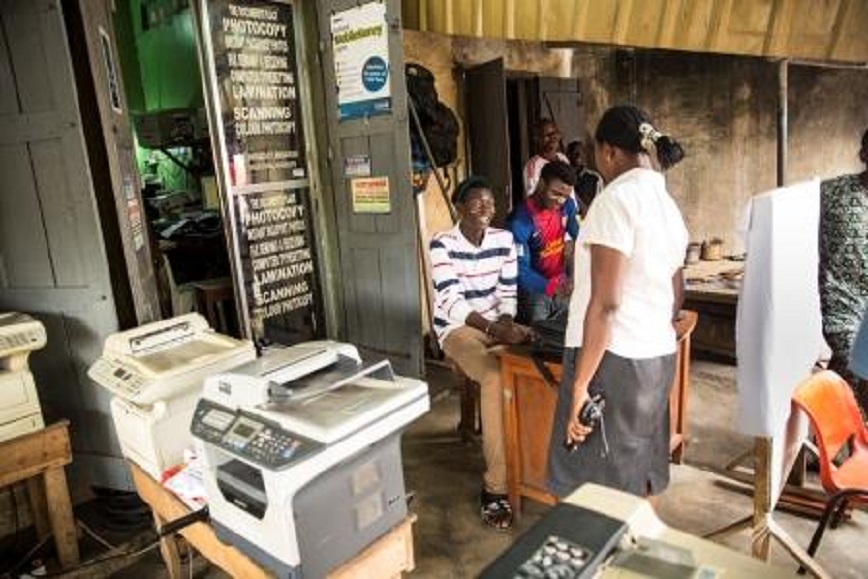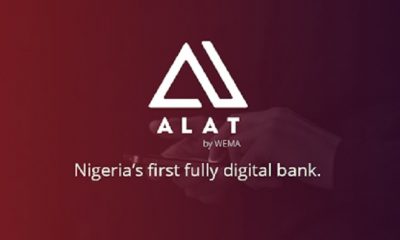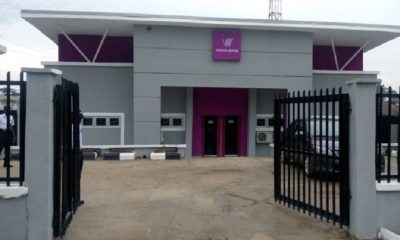Banking
Why Small Businesses are Thriving Better With Wema Bank

For decades, support to start-ups and small businesses (grouped under the acronym MSMEs) in Nigeria has been less than required, owing to a lack of proper bankable business structure, deficient collateral requirement, and low margins needed to attract funding from commercial banks. Wema Bank, however, seems intent on shaping a new reality for small businesses in Nigeria.
Wema Bank, the innovative lender behind Africa’s first fully digital bank ALAT, has over the years been passionate about supporting micro, small and medium sized businesses in Nigeria. But over the last six months, it has reviewed the way it backs MSMEs by delivering sustainable and value-adding support that impacts positively on business growth and profitability.
One of these offerings, the My Business Account Suite, was recently reviewed to improve cost effectiveness and deliver maximum convenience. It is a current account product with a concessionary transaction fee and ‘Zero Account Maintenance Fee’ for Startups and medium-sized businesses. Businesses can also earn interest on funds domiciled in this current account.
The Bank is also bringing businesses together for capacity building programmes, designed to enhance structuring and spur growth. In July, the Bank sponsored several small and medium scale businesses to a session on building sustainable wealth, organized by PwC in Lagos. The training featured experts from key growth sectors as well as business managers and successful entrepreneurs. Discussions and insights were shared, and these experts touched on critical aspects of business building including bookkeeping and accounting to tax efficiency, raising funds for business and much more.
Though these trainings and product offerings help, funding remains critical to growth, particularly for MSMEs. Access to cheap funding continues to limit the ability of small businesses in Nigeria to scale adequately. This narrative can be changed with the new partnerships Wema Bank has entered.
The Bank recently entered into partnerships with Development Bank of Nigeria (DBN) to improve access to cheaper funds for small businesses. DBN is a licensed wholesale Development Financial Institution(DFI) set up by the Federal Government of Nigeria in collaboration with other international development partners to alleviate the financing constraints of the Micro Small and Medium Scale Enterprises (MSMEs) in Nigeria.
DBN will fund MSMEs through Participating Financial Institutions(PFIs). Wema is one of those selected. Through this partnership, MSMEs and Commercial businesses of all business segments can be availed up to N153million and N610million respectively. As a bank that prioritizes support for smaller businesses, Wema Bank was the first commercial bank to disburse this loan. The DBN offering is available to both new and existing business customers. New customers can visit any Wema nearest branch for enquiries and loan processing.
A similar arrangement exists with the Bank of Industry BOI to further enhance funding to micro-businesses in the service sector, manufacturing, Agric value chain and to Traders of locally made goods at an affordable rate. Wema Bank also recently secured $35 million from the African Development Bank and ICD to fund small businesses across the country.
While access to cheap funds is great, access to new markets offers even more promise. Expanding into new markets via traditional means requires substantial capital outlay, which most smaller businesses lack. To ensure MSMEs can scale efficiently, Wema Bank has unveiled a simple, self-onboarding payment gateway platform for merchants to receive payments on their website seamlessly. This ensures small businesses can market their products and services to a wider community of potential customers, digitally, without having to incur additional cost on setting up new offices and managing operations from several locations.
The Nigerian economy is driven, significantly, by a vast number of SMEs and as a financial institution committed to wealth creation, the Bank seems keen on changing the prospects of these businesses and appears unrelenting its pursuit to build the smaller businesses of today into reputable multinationals of tomorrow.
Banking
Moniepoint Processes N412trn Transactions, Disburses N1trn Loans in 2025

By Adedapo Adesanya
Nigerian financial services firm, Moniepoint Incorporated, processed N412 trillion in transaction value and disbursed more than N1 trillion in loans to small businesses in 2025, as the company continues to grow Nigeria’s expanding retail payments and credit structure.
The company said it handled more than 14 billion transactions during the year and now powers about 80 per cent of in-person payments nationwide, underscoring the increasing concentration of payment flows through a small number of fintech platforms.
Moniepoint also averaged 1.67 billion monthly transactions in 2025 and grew its card user base by 200 per cent, with its cards being used 1.7 million times daily.
The organisation also processed over 500,000 data renewals daily, while customers spent N90 million ($64,264) daily at gyms.

Moniepoint’s scale reflects a broader shift in Nigeria’s payments landscape, where point-of-sale terminals and digital transfers have become central to everyday commerce, from neighbourhood shops to open-air markets.
Founded in 2015, Moniepoint has evolved from a backend technology provider into Nigeria’s largest merchant acquirer, offering payments, banking, credit, foreign exchange and business management tools to more than 6 million active businesses.
The company said it expanded lending to small businesses that are often excluded from bank credit, disbursing more than N1 trillion in loans through its microfinance banking unit in the year under review.
“Our focus has been on building infrastructure that works for how businesses actually operate,” said Mr Tosin Eniolorunda, Moniepoint’s founder and chief executive, pointing to the prevalence of informal trade in Africa’s largest economy.
In 2025, Moniepoint became a unicorn after it raised more than $200 million in a Series C funding round backed by investors including Development Partners International, Google’s Africa Investment Fund, Visa, the International Finance Corporation and Verod Capital, providing capital to scale its payments and financial services operations.
Beyond acquiring, the company said its switching and processing subsidiary, TeamApt Ltd, secured licences from Mastercard and Visa to operate as a processor and acquirer, enabling it to handle international card payments and provide switching services to other businesses across Africa. Its web payments gateway, Monnify, processed N25 trillion in transactions during the year.
Recently, the Central Bank of Nigeria (CBN) upgraded Moniepoint’s microfinance bank to a national microfinance bank licence, allowing it to expand its footprint across the country and broaden the range of products that it can offer.

Banking
Standard Bank Helps Aradel Energy With $250m Financing Facility

By Aduragbemi Omiyale
A $250 million financing facility to support the acquisition of about 40 per cent equity in ND Western Limited from Petrolin Trading Limited has been secured by Aradel Energy Limited, a wholly owned subsidiary of Aradel Holdings Plc.
The funding package was facility for the energy firm by Standard Bank, which comprises Stanbic IBTC Capital Limited, Stanbic IBTC Bank Limited, and the Standard Bank of South Africa Limited.
The facility, Business Post gathered, was structured to support Aradel Energy’s strategic growth agenda, the refinancing of existing loan facilities, and the funding of increased production from the company’s existing asset base.
Aradel Energy is the operator of the Ogbele and Omerelu onshore marginal fields, as well as OPL 227 in shallow water terrain.
Prior to the transaction, Aradel Energy held a 41.67 per cent equity interest in ND Western, and following the completion of the acquisition, its shareholding in ND Western has increased to 81.67 per cent.
ND Western holds a 45 per cent participating interest in OML 34 and a 50 per cent equity interest in Renaissance Africa Energy Company Limited, the operator of the Renaissance Joint Venture and a 30 per cent owner of one of Nigeria’s largest and most strategic energy portfolios.
As a result of the transaction, Aradel Energy’s indirect equity interest in Renaissance has increased to 53.3 per cent, significantly strengthening the company’s upstream position and long-term value creation potential.
Standard Bank acted as Global Coordinator and Bookrunner, leading the structuring, execution, and funding of the facility, affirming its deep sectoral expertise and reinforces its position as a leading financier in Africa’s energy industry.
This transaction reinforces Standard Bank Group’s commitment to providing strategic capital to clients as they execute on their transformative growth objectives.
By delivering tailored financing solutions that enable sustainable value creation, the Bank remains a trusted partner to leading corporations across Africa’s evolving energy landscape.
“As Aradel Energy consolidates its position as one of Nigeria’s leading oil and gas companies, Stanbic IBTC Bank is proud to serve as a trusted long-term partner supporting the company’s growth ambitions,” the Executive Director for Corporate and Transaction Banking at Stanbic IBTC Bank, Mr Eric Fajemisin, stated.
Also commenting, the Regional Head of Energy and Infrastructure Finance for West Africa at Standard Bank, Mr Cody Aduloju, said, “The transaction illustrates Standard Bank’s ability to deliver large-scale, tailored funding solutions and further demonstrates our support to the fast-growing indigenous companies of Nigeria’s oil and gas sector.”
The chief executive of Aradel Holdings, Mr Adegbite Falade, said, “The acquisition bolsters Aradel Energy’s competitive positioning across Nigeria’s oil and gas value chain and supports our commitment to strategic growth, asset optimisation, and enduring value creation. We are pleased to have partnered with Standard Bank, who supported us and delivered a fully funded solution under very tight timelines.”
Banking
CBN Upgrades Operating Licences of OPay, Moniepoint, Others to National

By Modupe Gbadeyanka
The operating licences of major financial technology (fintech) platforms like OPay and Moniepoint, have been upgraded to national by the Central Bank of Nigeria (CBN).
Also upgraded by the banking sector regulator were PalmPay, Kuda Bank, and Paga after compliance with some regulatory requirements, allowing them to operate across Nigeria.
Speaking at annual conference of the Committee of Heads of Banks’ Operations in Lagos recently, the Director of the Other Financial Institutions Supervision Department of the CBN, Mr Yemi Solaja, said the licences were upwardly reviewed after the financial institutions met some requirements, including the Know-Your-Customer (KYC) policy.
“Institutions like Moniepoint MFB, Opay, Kuda Bank, and others have now been upgraded. In practice, their operations are already nationwide,” he said at the event.
The upgrade also reinforces financial inclusion, as fintechs and agent networks continue to play a pivotal role in providing access to banking and payments services, especially in rural and underserved areas.
The central bank executive stressed the importance of physical presence for customer support.
According to him, “Most of their customers operate in the informal sector. They need a clear point of contact if any issues arise,” to strengthen internal controls, and enhance customer service, particularly around KYC and anti-money laundering (AML) processes.
-

 Feature/OPED6 years ago
Feature/OPED6 years agoDavos was Different this year
-
Travel/Tourism9 years ago
Lagos Seals Western Lodge Hotel In Ikorodu
-

 Showbiz3 years ago
Showbiz3 years agoEstranged Lover Releases Videos of Empress Njamah Bathing
-

 Banking8 years ago
Banking8 years agoSort Codes of GTBank Branches in Nigeria
-

 Economy3 years ago
Economy3 years agoSubsidy Removal: CNG at N130 Per Litre Cheaper Than Petrol—IPMAN
-

 Banking3 years ago
Banking3 years agoSort Codes of UBA Branches in Nigeria
-

 Banking3 years ago
Banking3 years agoFirst Bank Announces Planned Downtime
-

 Sports3 years ago
Sports3 years agoHighest Paid Nigerian Footballer – How Much Do Nigerian Footballers Earn























